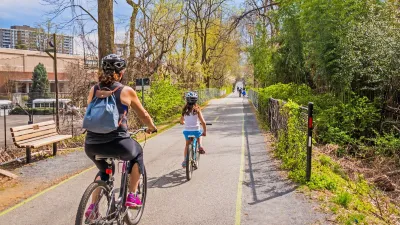An article on Washington Post's Wonkblog says what some bikers were thinking: sometimes it feels safer to break the law.
Emily Badger begins an article about bikers who flout traffic laws by admitting that she occasionally breaks the law while on her bike—not because of some reckless impulse but because sometimes on a bike safer conditions are achieved by bending the rules.
The problem, according to the article is that "we don't really understand — and we definitely don't talk about — the behavioral psychology of cycling all that well." It's much easier, according to Badger, for drivers to "picture all scofflaws as that caricature of a New York City bike messenger, a professional risk-taker who laughs at traffic laws and the suckers who obey them."
These questions lead Badger to examine the work of Wesley Marshall, an assistant professor of civil engineering at the University of Colorado who is also co-director of the Active Communities Transportation Research Group, and a team of researchers examining "scofflaw behavior, why people say they do it (drivers and cyclists alike), and when they don't."
Why might this work be valuable? "More data on the scofflaws inside all of us could potentially help create safer streets, even…more productive public debate about how cars and cyclists coexist," writes Badger.
FULL STORY: Let’s talk seriously about why cyclists break traffic laws

Planetizen Federal Action Tracker
A weekly monitor of how Trump’s orders and actions are impacting planners and planning in America.

Restaurant Patios Were a Pandemic Win — Why Were They so Hard to Keep?
Social distancing requirements and changes in travel patterns prompted cities to pilot new uses for street and sidewalk space. Then it got complicated.

Map: Where Senate Republicans Want to Sell Your Public Lands
For public land advocates, the Senate Republicans’ proposal to sell millions of acres of public land in the West is “the biggest fight of their careers.”

Maui's Vacation Rental Debate Turns Ugly
Verbal attacks, misinformation campaigns and fistfights plague a high-stakes debate to convert thousands of vacation rentals into long-term housing.

San Francisco Suspends Traffic Calming Amidst Record Deaths
Citing “a challenging fiscal landscape,” the city will cease the program on the heels of 42 traffic deaths, including 24 pedestrians.

California Homeless Arrests, Citations Spike After Ruling
An investigation reveals that anti-homeless actions increased up to 500% after Grants Pass v. Johnson — even in cities claiming no policy change.
Urban Design for Planners 1: Software Tools
This six-course series explores essential urban design concepts using open source software and equips planners with the tools they need to participate fully in the urban design process.
Planning for Universal Design
Learn the tools for implementing Universal Design in planning regulations.
Heyer Gruel & Associates PA
JM Goldson LLC
Custer County Colorado
City of Camden Redevelopment Agency
City of Astoria
Transportation Research & Education Center (TREC) at Portland State University
Camden Redevelopment Agency
City of Claremont
Municipality of Princeton (NJ)





























